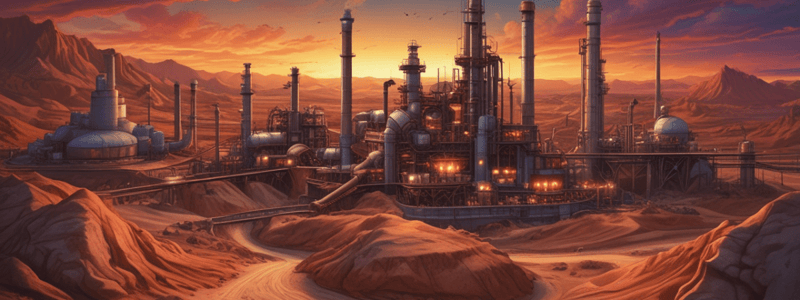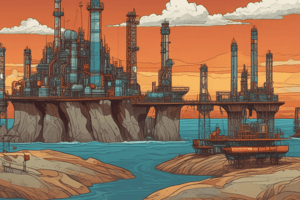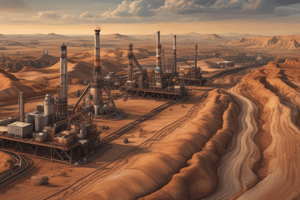Podcast
Questions and Answers
What is the primary objective of secondary methods in oil and gas production?
What is the primary objective of secondary methods in oil and gas production?
- To decrease the friction between the oil and the reservoir surface
- To increase the producible reservoir area
- To increase the oil viscosity or support its movability (correct)
- To reduce the viscosity of the oil
What is the purpose of CO2 injection in oil and gas production?
What is the purpose of CO2 injection in oil and gas production?
- To increase the producible reservoir area
- To reduce the viscosity of the oil
- To decrease the friction between the oil and the reservoir surface
- To increase the viscosity of the unrecovered oil (correct)
What is the purpose of hydraulic fracturing in oil and gas production?
What is the purpose of hydraulic fracturing in oil and gas production?
- To increase the producible reservoir area
- To increase the movability of the resources (correct)
- To reduce the viscosity of the oil
- To decrease the friction between the oil and the reservoir surface
Why is understanding the subsurface geology essential in oil and gas exploration and development?
Why is understanding the subsurface geology essential in oil and gas exploration and development?
What is one of the primary uses of oil and natural gas?
What is one of the primary uses of oil and natural gas?
What is the primary source of fossil fuels?
What is the primary source of fossil fuels?
Why are fossil fuels classified as nonrenewable resources?
Why are fossil fuels classified as nonrenewable resources?
What is the primary purpose of exploring oil and natural gas reserves?
What is the primary purpose of exploring oil and natural gas reserves?
What is required for the formation of crude oil, heavy oil, and natural gas?
What is required for the formation of crude oil, heavy oil, and natural gas?
What is the role of geologists and engineers in the exploration of oil and natural gas reserves?
What is the role of geologists and engineers in the exploration of oil and natural gas reserves?
What is a major challenge in oil and gas exploration?
What is a major challenge in oil and gas exploration?
What is the probability of extracting oil and gas from proven reserves?
What is the probability of extracting oil and gas from proven reserves?
What is the main difference between proven and unproven reserves?
What is the main difference between proven and unproven reserves?
What is the purpose of primary (traditional) methods in fossil fuel extraction?
What is the purpose of primary (traditional) methods in fossil fuel extraction?
Who is known as the engineer who started the oil industry in the United States of America?
Who is known as the engineer who started the oil industry in the United States of America?
Flashcards are hidden until you start studying
Study Notes
Oil and Natural Gas Reserves
- Oil and natural gas reserves are commercially recoverable fossil fuels, which are nonrenewable resources because they cannot be replaced.
- The formation of hydrocarbons takes millions of years through geological processes, involving the decomposition of organic matter in sedimentary rocks.
- Source rocks (organic-rich rocks) and reservoir rocks (rocks with porous spaces) are explored by geologists to identify potential hydrocarbon deposits.
Exploration and Development
- An integrated team of geologists and engineers work together to explore and extract hydrocarbons, using advanced technologies and computer software.
- The extracted hydrocarbons are refined and processed to be used commercially.
- Reserve estimates are calculated based on the exploration, drilling activities, and technologically advanced instruments.
Types of Oil Reserves
- Proven reserves are classified as 90% recoverable, with a high probability of extracting oil and gas from these reserves.
- Proven reserves can be further subdivided into proven developed and proven undeveloped.
- Unproven reserves have significant uncertainties, mainly due to political and administrative issues, and can be further subdivided into probable and possible.
Technology in Oil and Natural Gas Extraction
- Fossil fuel resources are extracted through primary (traditional) and secondary methods.
- Traditional methods involve vertical drilling and pumping, where crude oil flows up through the wellbore.
- Secondary methods, such as water flooding, CO2 injection, steam flooding, polymer flooding, and hydraulic fracturing, are used to increase the viscosity or mobility of the oil.
- Understanding the subsurface geology and interpreting the data are essential in oil and gas exploration and development.
The Uses of Oil and Natural Gas
- Oil and gas are used in transportation, heating, and various industrial developments.
- They are also valuable for petrochemical and manufacturing industries, as well as the food industry.
- Examples of oil and natural gas usage include:
- Gasoline
- Diesel fuel
- Jet fuel
- Heating oil
- Waxes
- Lubricant oils
- Asphalt
- Synthetic rubber
- Plastics
- Petroleum coke
- Heating
- Electric generation
Studying That Suits You
Use AI to generate personalized quizzes and flashcards to suit your learning preferences.




